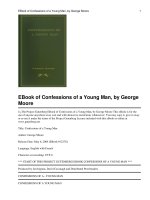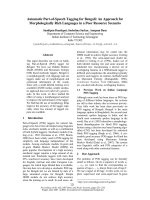A poor wise man
Bạn đang xem bản rút gọn của tài liệu. Xem và tải ngay bản đầy đủ của tài liệu tại đây (1.31 MB, 337 trang )
TheProjectGutenbergEBookofAPoorWiseMan,byMaryRobertsRinehart
ThiseBookisfortheuseofanyoneanywhereatnocostandwith
almostnorestrictionswhatsoever.Youmaycopyit,giveitawayor
re-useitunderthetermsoftheProjectGutenbergLicenseincluded
withthiseBookoronlineatwww.gutenberg.org
Title:APoorWiseMan
Author:MaryRobertsRinehart
ReleaseDate:November3,2008[EBook#1970]
LastUpdated:March9,2018
Language:English
***STARTOFTHISPROJECTGUTENBERGEBOOKAPOORWISEMAN***
ProducedbyAnAnonymousProjectGutenbergVolunteer,andDavidWidger
APOORWISEMAN
ByMaryRobertsRinehart
CONTENTS
CHAPTERI
CHAPTERII
CHAPTERIII
CHAPTERIV
CHAPTERV
CHAPTERVI
CHAPTERVII
CHAPTERVIII
CHAPTERIX
CHAPTERX
CHAPTERXI
CHAPTERXII
CHAPTERXIII
CHAPTERXIV
CHAPTERXV
CHAPTERXVI
CHAPTERXVII
CHAPTERXVIII
CHAPTERXIX
CHAPTERXX
CHAPTERXXI
CHAPTERXXII
CHAPTERXXIII
CHAPTERXXIV
CHAPTERXXV
CHAPTERXXVI
CHAPTERXXVII
CHAPTERXXVIII
CHAPTERXXIX
CHAPTERXXX
CHAPTERXXXI
CHAPTERXXXII
CHAPTERXXXIII
CHAPTERXXXIV
CHAPTERXXXV
CHAPTERXXXVI
CHAPTERXXXVII
CHAPTERXXXVIII
CHAPTERXXXIX
CHAPTERXL
CHAPTERXLI
CHAPTERXLII
CHAPTERXLIII
CHAPTERXLIV
CHAPTERXLV
CHAPTERXLVI
CHAPTERXLVII
CHAPTERXLVIII
CHAPTERXLIX
CHAPTERL
CHAPTERLI
CHAPTERLII
CHAPTERI
The city turned its dreariest aspect toward the railway on blackened walls,
irregularandill-pavedstreets,gloomywarehouses,andoverallagray,smokeladen atmosphere which gave it mystery and often beauty. Sometimes the
softened towers of the great steel bridges rose above the river mist like fairy
towers suspended between Heaven and earth. And again the sun tipped the
surrounding hills with gold, while the city lay buried in its smoke shroud, and
whiteghostsofriverboatsmovedspectrallyalong.
Sometimes it was ugly, sometimes beautiful, but always the city was
powerful, significant, important. It was a vast melting pot. Through its gates
came alike the hopeful and the hopeless, the dreamers and those who would
destroy those dreams. From all over the world there came men who sought a
chance to labor. They came in groups, anxious and dumb, carrying with them
theirpatheticbundles,andshepherdedbymenwithcunningeyes.
Rawmaterial,forthecrucibleofthecity,aspotentiallypowerfulastheiron
orewhichenteredthecitybythesamegate.
The city took them in, gave them sanctuary, and forgot them. But the
shepherdswiththecunningeyesremembered.
LilyCardew,standinginthetrainshedonemorningearlyinMarch,watched
suchalinegoby.Shewatcheditwithinterest.Shehaddevelopedanewinterest
inpeopleduringtheyearshehadbeenaway.Shehadseen,inthearmycamp,
similar shuffling lines of men, transformed in a few hours into ranks of
uniformedsoldiers,beginningalreadytobeactuatedbythesamemotive.These
aliens,goingby,wouldbecomecitizens.Verysoonnowtheywouldappearon
thestreetsinnewAmericanclothesofextraordinarycutandcolor,theirhaircut
withclippersalmosttothecrown,andsurmountedbyderbyhatsalwaysasize
toosmall.
Lilysmiled,andlookedoutforhermother.Shewassuddenlyunaccountably
glad to be back again. She liked the smoke and the noise, the movement, the
sense of things doing. And the sight of her mother, small, faultlessly tailored,
wearing a great bunch of violets, and incongruous in that work-a-day
atmosphere,sethersmilingagain.
Howfamiliaritallwas!Andheavens,howyoungshelooked!Thelimousine
wasatthecurb,andafootmanasimmaculatelyturnedoutashermotherstood
with a folded rug over his arm. On the seat inside lay a purple box. Lily had
knownitwouldbethere.Theywouldbeostensiblyfromherfather,becausehe
hadnotbeenabletomeether,butsheknewquitewellthatGraceCardewhad
stoppedattheflorist'sonherwaydowntownandboughtthem.
A little surge of affection for her mother warmed the girl's eyes. The small
attentions which in the Cardew household took the place of loving
demonstrations had always touched her. As a family the Cardews were rather
looselyknittedtogether,buttherewassomethingverylovableabouthermother.
GraceCardewkissedher,andthenheldheroffandlookedather.
“Mercy,Lily!”shesaid,“youlookasoldasIdo.”
“Older,Ihope,”Lilyretorted.“Whatamarvelyouare,Gracedear.”Nowand
thenshecalledhermother“Grace.”Itwasbywayofbeingasmalljokebetween
them, but limited to their moments alone. Once old Anthony, her grandfather,
hadoverheardher,andtherehadbeenratherarowaboutit.
“Ifeelhorriblyold,butIdidn'tthinkIlookedit.”
They got into the car and Grace held out the box to her. “From your father,
dear.Hewantedsotocome,butthingsaredreadfulatthemill.Isupposeyou've
seenthepapers.”Lilyopenedthebox,andsmiledathermother.
“Yes, I know. But why the subterfuge about the flowers, mother dear?
Honestly,didhesendthem,ordidyougetthem?Butnevermindaboutthat;I
know he's worried, and you're sweet to do it. Have you broken the news to
grandfatherthatthelastoftheCardewsiscominghome?”
“Hesentyouallsortsofmessages,andhe'llseeyouatdinner.”
Lilylaughedoutatthat.
“You darling!” she said. “You know perfectly well that I am nothing in
grandfather's young life, but the Cardew women all have what he likes to call
savoirfaire.Whatwouldtheydo,fatherandgrandfather,ifyoudidn'tgothrough
lifesmoothingthingsforthem?”
Grace looked rather stiffly ahead. This young daughter of hers, with her
directness and her smiling ignoring of the small subterfuges of life, rather
frightened her. The terrible honesty of youth! All these years of ironing the
wrinkles out of life, of smoothing the difficulties between old Anthony and
Howard, and now a third generation to contend with. A pitilessly frank and
unconsciouslycruelgeneration.SheturnedandeyedLilyuneasily.
“You look tired,” she said, “and you need attention. I wish you had let me
sendCastletoyou.”
But she thought that lily was even lovelier than she had remembered her.
Lovelyratherthanbeautiful,perhaps.Herfacewaslesschildishthanwhenshe
had gone away; there was, in certain of her expressions, an almost alarming
maturity.Butperhapsthatwasfatigue.
“I couldn't have had Castle, mother. I didn't need anything. I've been very
happy,really,andverybusy.”
“Youhavebeenveryvaguelatelyaboutyourwork.”
Lilyfacedhermothersquarely.
“Ididn'tthinkyou'dmuchlikehavingmedoit,andIthoughtitwoulddrive
grandfathercrazy.”
“Ithoughtyouwereinacanteen.”
“Notlately.I'vebeenlookingaftergirlswhohadfollowedsoldierstocamps.
Someofthemweregoingtohavebabies,too.Itwasratherawful.Wemarried
quitealotofthem,however.”
The curious reserve that so often exists between mother and daughter held
Grace Cardew dumb. She nodded, but her eyes had slightly hardened. So this
waswhatwarhaddonetoher.Shehadhadnoson,andhadthankedGodforit
during the war, although old Anthony had hated her all her married life for it.
Butshehadgivenherdaughter,herclear-eyeddaughter,andtheyhadshownher
thedregsoflife.
Herthoughtswentbackovertheyears.ToLilyasachild,withMademoiselle
always at her elbow, and life painted as a thing of beauty. Love, marriage and
birthweredivineaccidents.Deathwasaquietsleep,withheavenjustbeyond,a
sleep which came only to age, which had wearied and would rest. Then she
rememberedthedaywhenElinorCardew,poorunhappyElinor,hadfledbackto
Anthony'srooftohaveababy,andafterafewrapturousweeksforLilythebaby
haddied.
“But the baby isn't old,” Lily had persisted, standing in front of her mother
withangry,accusingeyes.
Gracewasnotanimaginativewoman, butsheturneditratherneatly,asshe
toldHowardlater.
“Itwassuchanicebaby,”shesaid,feelingforanidea.“IthinkprobablyGod
waslonelywithoutit,andsentanangelforitagain.”
“Butitisstillupstairs,”Lilyhadinsisted.Shehadhadacuriousinstinctfor
truth, eventhen.But thereGrace'simaginationhadfailedher,andshesentfor
Mademoiselle. Mademoiselle was a good Catholic, and very clear in her own
mind, but what she left in Lily's brain was a confused conviction that every
personwastwopersons,abodyandasoul.Deathwassimplyasplit-up,then.
Onepartofyou,thepartthatbathedeverymorningandhaditstoe-nailscut,and
went to dancing school in a white frock and thin black silk stockings and
carriagebootsoverpumps,thatpartwasburiedandwouldonlycameupagainat
the Resurrection. But the other part was all the time very happy, and mostly
singing.
Lilydidnotliketosing.
Then there was the matter of tears. People only cried when they hurt
themselves. She had been told that again and again when she threatened tears
over her music lesson. But when Aunt Elinor had gone away she had found
Mademoiselle, the deadly antagonist of tears, weeping. And here again Grace
rememberedthechild'swide,insistenteyes.
“Why?”
“SheissorryforAuntElinor.”
“Becauseherbaby'sgonetoGod?Sheoughttobeglad,oughtn'tshe?”
“Not that;” said Grace, and had brought a box of chocolates and given her
one,althoughtheywerenotpermittedsaveoneaftereachmeal.
Then Lily had gone away to school. How carefully the school had been
selected!Whenshecameback,however,therehadbeennomorequestions,and
Grace had sighed with relief. That bad time was over, anyhow. But Lily was
rather difficult those days. She seemed, in some vague way, resentful. Her
mother found her, now and then, in a frowning, half-defiant mood. And once,
when Mademoiselle had ventured some jesting remark about young Alston
Denslow,shewasstupefiedtoseethegirlmarchoutoftheroom,herchinhigh,
nottobeseenagainforhours.
Grace's mind was sub-consciously remembering those things even when she
spoke.
“Ididn'tknowyouwerehavingtolearnaboutthatsideoflife,”shesaid,after
abriefsilence.
“Thatsideoflifeislife,mother,”Lilysaidgravely.ButGracedidnotreplyto
that.Itwascharacteristicofhertofollowherownlineofthought.
“Iwishyouwouldn'ttellyourgrandfather.Youknowhefeelsstronglyabout
somethings.Andhehasn'tforgivenmeyetforlettingyougo.”
Rather diffidently Lily put her hand on her mother's. She gave her rare
caresses shyly, with averted eyes, and she was always more diffident with her
mother than with her father. Such spontaneous bursts of affection as she
sometimes showed had been lavished on Mademoiselle. It was Mademoiselle
she had hugged rapturously on her small feast days, Mademoiselle who never
demandedaffection,andsoreceivedit.
“Poormother!”shesaid,“Ihavemadeithardforyou,haven'tI?Isheasbad
asever?”
Shehadnotpinnedontheviolets,butsatholdingtheminherhands,nowand
thentakingaluxurioussniff.Shedidnotseemtoexpectareply.BetweenGrace
andherselfitwasquiteunderstoodthatoldAnthonyCardewwasalwaysasbad
ascouldbe.
“Thereissomesortoftroubleatthemill.Yourfatherisworried.”
AndthistimeitwasLilywhodidnotreply.Shesaid,inconsequentially:
“We're saved, and it's all over. But sometimes I wonder if we were worth
saving. It all seems such a mess, doesn't it?” She glanced out. They were
drawingupbeforethehouse,andshelookedathermotherwhimsically.
“The last of the Cardews returning from the wars!” she said. “Only she is
unfortunately a she, and she hasn't been any nearer the war than the State of
Ohio.”
Hervoicewasgayenough,butshehadaquickvisionofthegrimoldhouse
had she been the son they had wanted to carry on the name, returning from
France.
TheCardewshadfightingtraditions.Theyhadfoughtineverywarfromthe
Revolution on. There had been a Cardew in Mexico in '48, and in that upper
suite of rooms to which her grandfather had retired in wrath on his son's
marriage,sherememberedhersenseofaweasachildonseeingonthewallthe
swordhehadwornintheCivilWar.Hewasasmallman,andthescabbardwas
badlywornattheend,mutetestimonytothelongforcedmarchesofhisyouth.
HerfatherhadgonetoCubain'98,andhadalmostdiedoftyphoidfeverthere,
contractedinthemarshesofFlorida.
Yes,theyhadbeenafightingfamily.Andnow—
Her mother was determinedly gay. There were flowers in the dark old hall,
andGrayson,thebutler,evidentlywaitinginsidethedoor,greetedherwiththe
familiarityoftheoldservantwhohadslippedhersweetsfromthepantryafter
dinnerpartiesinherlittle-girlyears.
“Welcomehome,MissLily,”hesaid.
Mademoisellewaslurkingonthestairway,inanewlacecollaroverherold
blackdress.Lilyrecognizedinthecollaragreatoccasion,forMademoisellewas
Frenchandthrifty.Suddenlyawaveofwarmthandgladnessfloodedher.This
was home. Dear, familiar home. She had come back. She was the only young
thinginthehouse.Shewouldbringthemgladnessandyouth.Shewouldtryto
makethemhappy.Alwaysbeforeshehadtaken,butnowshemeanttogive.
Notthatsheformulatedsuchathought.Itwasanemotion,rather.Sheranup
thestairsandhuggedMademoisellewildly.
“Youdarlingoldthing!”shecried.ShelapsedintoFrench.“Isawthecollarat
once.Andthink,itisover!Itisfinished.AndallyourniceFrenchrelativesare
sittingontheboulevardsinthesun,andsippingtheirlittleglassesofwine,and
risingandbowingwhenaprettygirlpasses.Isitnotso?”
“Itisso,Godandthesaintsbepraised!”saidMademoiselle,huskily.
GraceCardewfollowedthemupthestaircase.HerFrenchwasnegligible,and
shefeltagain,asindaysgoneby,shutfromthelittleworldoftwowhichheld
her daughter and governess. Old Anthony's doing, that. He had never forgiven
hissonhisplebeianmarriage,andanearlyconversationreturnedtoher.Itwas
onLily'sfirstbirthdayandhehadmadeoneofhisrarevisitstothenursery.He
hadbroughtwithhimapearlinavelvetcase.
“All our women have their own pearls,” he had said. “She will have her
grandmother'salsowhenshemarries.Ishallgiveheronethefirstyear,twothe
second,andsoon.”Hehadstoodlookingdownatthechildcritically.“She'sa
Cardew,” he said at last. “Which means that she will be obstinate and selfwilled.”Hehadpausedthere,butGracehadnotrefutedthestatement.Hehad
grinned.“Asyouknow,”headded.“Isshetalkingyet?”
“Awordortwo,”Gracehadsaid,withnomorewarmthinhertonethanwas
inhis.
“Verywell.GetheraFrenchgoverness.SheoughttospeakFrenchbeforeshe
doesEnglish.Itisoneoftheaccomplishmentsofalady.Getagoodwoman,and
forheaven'ssakearrangetoserveherbreakfastinherroom.Idon'twanttohave
tobepleasanttoanychatteringFrenchwomanateightinthemorning.”
“No,youwouldn't,”Gracehadsaid.
Anthony had stamped out, but in the hall he smiled grimly. He did not like
Howard'swife,butshewasnotafraidofhim.Herespectedherforthat.Hetook
goodcaretoseethattheFrenchwomanwasfound,andatdinner,theonlymeal
hetookwiththefamily,hewouldnowandthensendforthegovernessandLily
tocomeinfordessert.That,ofcourse,waslateron,whenthechildwasnearly
ten.Thenwouldfollowathree-corneredconversationinrapidFrench,Howard
andAnthonyandLily,withMademoisellejoiningintimidly,andwithGrace,at
thesideofthetable,pretendingtoeatandfeelingcutoff,inamiddle-classworld
ofherown,atthesideofthetable.AnthonyCardewhadretainedtheheadofhis
table,andhehadneveraskedhertotakehisdeadwife'splace.
After a time Grace realized the consummate cruelty of those hours, the fact
thatLilywassentfor,notonlybecausetheoldmancaredtoseeher,buttomake
Gracefeeltheoutsiderthatshewas.Shemadedesperateeffortstoconquerthe
hated language, but her accent was atrocious. Anthony would correct her
suavely, and Lily would laugh in childish, unthinking mirth. She gave it up at
last.
She never told Howard about it. He had his own difficulties with his father,
andshewouldnotaddtothem.Shemanagedthehouse,checkedoverthebills
andsentthemtotheoffice,putupacheerfulandcourageousfront,andaftera
time sheathed herself in an armor of smiling indifference. But she thanked
heaven when the time came to send Lily away to school. The effort of
concealingthearmedneutralitybetweenAnthonyandherselfwasgrowingmore
wearing. The girl was observant. And Anthony had been right, she was a
Cardew. She would have fought her grandfather out on it, defied him, accused
him,hatedhim.AndGracewantedpeace.
OnceagainasshefollowedLilyandMademoiselleupthestairsshefeltthe
barrieroflanguage,andbackofittheCardewprideandtraditionsthatsomehow
cutheroff.
But in Lily's rooms she was her sane and cheerful self again. Inside the
doorway the girl was standing, her eyes traveling over her little domain
ecstatically.
“Howlovelyofyounottochangeathing,mother!”shesaid.“Iwassoafraid
—Iknowhowyouhatemystuff.ButImighthaveknownyouwouldn't.Allthe
timeI'vebeenaway,sleepinginadormitory,andtakingturnsatthebath,Ihave
thought of my own little place.” She wandered around, touching her familiar
possessionswithcaressinghands.“I'veagoodnotion,”shedeclared,“togoto
bedimmediately,justforthepleasureoflyinginlinensheetsagain.”Suddenly
she turned to her mother. “I'm afraid you'll find I've made some queer friends,
mother.”
“Whatdoyoumeanby'queer'?”
“PeoplenoproperCardewwouldcaretoknow.”Shesmiled.“Where'sEllen?
IwanttotellherImetsomebodysheknowsoutthere,thenicestsortofaboy.”
She went to the doorway and called lustily: “Ellen! Ellen!” The rustling of
starchedskirtsansweredherfromdownthecorridor.
“Iwishyouwouldn'tcall,dear.”Gracelookedanxious.“Youknowhowyour
grandfather—there'sabellforEllen.”
“What we need around here,” said Lily, cheerfully, “is a little more calling.
Andifgrandfatherthinksitisunbefittingthefamilydignityhecanputcottonin
his ears. Come in, Ellen. Ellen, do you know that I met Willy Cameron in the
camp?”
“Willy!”squealedEllen.“YoumetWilly?Isn'theafineboy,MissLily?”
“He's wonderful,” said Lily. “I went to the movies with him every Friday
night.”Sheturnedtohermother.“Youwouldlikehim,mother.Hecouldn'tget
intothearmy.Heisalittlebitlame.And—”shesurveyedGracewithamused
eyes,“youneedn'tthinkwhatyouarethinking.Heistallandthinandnotatall
good-looking.Ishe,Ellen?”
“He is a very fine young man,” Ellen said rather stiffly. “He's very highly
thoughtofinthetownIcomefrom.Hisfatherwasadoctor,andhisbuggyused
togoaroundday,andnight.Whenhefoundtheywouldn'ttakehimasasoldier
hewasliketobreakhisheart.”
“Lame?”Gracerepeated,ignoringEllen.
“Justalittle.Youforgetallaboutitwhenyouknowhim.Don'tyou,Ellen?”
ButatGrace'stoneEllenhadremembered.Shestiffened,andbecameagaina
housemaid in the Anthony Cardew house, a self-effacing, rubber-heeled, pinkuniformed lower servant. She glanced at Mrs. Cardew, whose eyebrows were
slightlyraised.
“Thank you, miss,” she said. And went out, leaving Lily rather chilled and
openlyperplexed.
“Well!”shesaid.Thensheglancedathermother.“Idobelieveyouarealittle
shocked, mother, because Ellen and I have a mutual friend in Mr. William
WallaceCameron!Well,ifyouwanttheexacttruth,hehadn'tanatomofusefor
meuntilheheardaboutEllen.”SheputanarmaroundGrace'sshoulders.“Brace
up,dear,”shesaid,smilingly.“Don'tyoucry.I'llbeaCardewbye-and-bye.”
“Did you really go to the moving pictures with him?” Grace asked, rather
unhappily. She had never been inside a moving picture theater. To her they
meant something a step above the corner saloon, and a degree below the
burlesque houses. They were constituted of bad air and unchaperoned young
women accompanied by youths who dangled cigarettes from a lower lip, all
obviously of the lower class, including the cigarette; and of other women,
sometimesdrab,draggedofbreastandcarryingchildrenwhoshouldhavebeen
in bed hours before; or still others, wandering in pairs, young, painted and
predatory. She was not imaginative, or she could not have lived so long in
AnthonyCardew'shouse.Sheneversaw,inthelonglinewaitingoutsideeven
themeanestofthelittletheatersthathadinvadedtheoncesacredvicinityofthe
Cardewhouse,thecryofeveryhumanheartforescapefromthesordid,thelure
ofromance,thecallofadventureandtheopenroad.
“Ican'tbelieveit,”sheadded.
Lilymadealittlegestureofhalf-amuseddespair.
“Dearest,”shesaid,“Idid.AndIlikedit.Mother,thingshavechangedalotin
twentyyears.SometimesIthinkthathere,inthishouse,youdon'trealizethat—”
shestruggledforaphrase—“thatthingshavechanged,”sheended,lamely.“The
social order, and that sort of thing. You know. Caste.” She hesitated. She was
young and inarticulate, and when she saw Grace's face, somewhat frightened.
ButshewasnotoldAnthony'sgranddaughterfornothing.“Thisideaofbeinga
Cardew,” she went on, “that's ridiculous, you know. I'm only half Cardew,
anyhow.Therestisyou,dear,andit'sgotbeingaCardewbeatenbyquitealot.”
Mademoisellewasdeftlyopeningthegirl'sdressingcase,butshepausednow
andturned.ItwastoGracethatshespoke,however.
“Theycomehomelikethat,allofthem,”shesaid.“InFrancealso.Butintime
theyseethewisdomoftheoldorder,andreturn.Itisoneofthefruitsofwar.”
Gracehardlyheardher.
“Lily,”sheasked,“youarenotinlovewiththisCameronperson,areyou?”
ButLily'seasylaughreassuredher.
“No,indeed,”shesaid.“Iamnot.Ishallprobablymarrybeneathme,asyou
wouldcallit,butnotWilliamWallaceCameron.Foronething,hewouldn'thave
grandfatherinhisfamily.”
SometimelaterMademoiselletappedatGrace'sdoor,andentered.Gracewas
recliningonachaiselongue,towelstuckedaboutherneckandoverherpillows,
while Castle, her elderly English maid, was applying ice in a soft cloth to her
face.Gracesatup.Thetowel,pinnedaroundherhairlikeacoif,gaveaplacid,
almostnun-likeappearancetoherstilllovelyface.
“Well?”shedemanded.“Gooutforaminute,Castle.”
Mademoisellewaiteduntilthemaidhadgone.
“I have spoken to Ellen,” she said, her voice cautious. “A young man who
does not care for women, a clerk in a country pharmacy. What is that, Mrs.
Cardew?”
“Itwouldbesodreadful,Mademoiselle.Hergrandfather—”
“But not handsome,” insisted Mademoiselle, “and lame! Also, I know the
child.Sheisnotinlove.Whenthatcomestoherweshallknowit.”
Gracelayback,relieved,butnotentirelycomforted.
“Sheischanged,isn'tshe,Mademoiselle?”
Mademoiselleshruggedhershoulders.
“A phase,” she said. She had got the word from old Anthony, who regarded
anymentalattitudethatdidnotconformwithhisownasaconditionthatwould
pass. “A phase, only. Now that she is back among familiar things, she will
becomeagainadaughterofthehouse.”
“Thenyouthinkthistalkaboutmarryingbeneathher—”
“She'ashadliberty,”saidMademoiselle,whosometimeslostanaspirate.“It
islikewinetotheyoung.Itintoxicates.Butit,too,passes.Inmycountry—”
But Grace had, for a number of years, heard a great deal of Mademoiselle's
country.Shesettledherselfonherpillows.
“CallCastle,please,”shesaid.“And—dowarnhernottovoicethoseideasof
herstohergrandfather.Inacountrypharmacy,yousay?”
“And lame, and not fond of women,” corroborated Mademoiselle. “Ca ne
pourraitpasetremieux,n'est-cepas?”
CHAPTERII
Shortly after the Civil War Anthony Cardew had left Pittsburgh and spent a
yearinfindingalocationfortheinvestmentofhissmallcapital.Thatwasinthe
very beginning of the epoch of steel. The iron business had already laid the
foundationsofitsfuturegreatness,butsteelwasstillinitsinfancy.
Anthony'sfatherhadbeenaniron-masterinasmallway,withamonthlypayrollofafewhundreddollars,andanabidingfaithinthefutureofiron.Buthe
had never dreamed of steel. But “sixty-five” saw the first steel rail rolled in
America, and Anthony Cardew began to dream. He went to Chicago first, and
fromtheretoMichigan,toseethefirstsuccessfulBessemerconverter.Whenhe
startedeastagainheknewwhathewastomakehislifework.
Hewasveryyoungandhiscapitalwassmall.Buthehadanabidingfaithin
thenewindustry.Notthathedreamedthenoffloatingsteelbattleships.Buthe
didforeseesteelinnewandvarioususes.Lateronhewasexperimentingwith
steelcableattheverytimeRoeblingmadeitacommercialpossibility,andwith
it the modern suspension bridge and the elevator. He never quite forgave
Roebling.Thatfailureofhis,thedifferenceonlyofamonthorso,wasoneofthe
few disappointments of his prosperous, self-centered, orderly life. That, and
Howard's marriage. And, at the height of his prosperity, the realization that
Howard'smiddle-classwifewouldneverbearason.
The city he chose was a small city then, yet it already showed signs of
approachinggreatness.Ontheeastside,acrosstheriver,hebuilthisfirstplant,a
small one, with the blast heated by passing through cast iron pipes, with the
furnaceman testing the temperature with strips of lead and zinc, and the skip
hoistapatientmule.
Hehadorewithineasyhaulingdistance,andhehadfuel,andhehad,astime
went on, a rapidly increasing market. Labor was cheap and plentiful, too, and
being American-born, was willing and intelligent. Perhaps Anthony Cardew's
sins of later years were due to a vast impatience that the labor of the early
seventieswasnolongertobehad.
The Cardew fortune began in the seventies. Up to that time there was a
struggle,butintheseventiesAnthonydidtwothings.HewenttoEnglandtosee
the furnaces there, and brought home a wife, a timid, tall Englishwoman of
irreproachablebirth,whoremainedalwaysanalieninthecrude,busynewcity.
Andhebuilthimselfahouse,abrickhouseinlowerEastAvenue,ahouserather
like his tall, quiet wife, and run on English lines. He soon became the leading
citizen.HewasoneofthecommitteetowelcomethePrinceofWalestothecity,
andfromtheverybeginninghetookhisplaceinthesociallife.
Hefounditveryrawattimes,crudeandnew.Hehimselflivedwithdignity
and elegant simplicity. He gave now and then lengthy, ponderous dinners,
makingoutthelistshimself,andhandingthemovertohistimidEnglishwifein
muchthemannerinwhichhegavethewinelistandthekeytothewinecellarto
thebutler.And,attheheadofhistable,heletothermentalkandlistened.They
talked,thoseindustrialpioneers,especiallyafterthewomenhadgone.Theysaw
thecitythecenterofgreatbusinessandgreatrailroads.Theytalkedofitscoal,
itsriver,andthegreatoilfieldsnotfarawaywhichwerethenintheirinfancy.
Allofthemdreamedadream,sawavision.Butnotallofthemlivedtoseetheir
dreamcometrue.
OldAnthonylivedtoseeit.
Inthelateeighties,hiswifehavingbeenbythattimedecorouslyinterredin
oneofthefirstgreatmausoleumswestofthemountains,AnthonyCardewfound
himselfalreadywealthy.Heownedoilwellsandcoalmines.Hisminessupplied
hiscokeovenswithcoal,andhisownriverboats,aswellasrailroadsinwhich
hewasadirector,carriedhissteel.
Helaboredablyandwell,andnotforwealthalone.Hewasoneofagroupof
big-visionedmenwhosawthatanationwasonlyasgreatasitsindustries.Itwas
only in his later years that he loved power for the sake of power, and when,
having outlived his generation, he had developed a rigidity of mind that made
himviewtheforcedcompromisesofthenewregimeaspusillanimous.
He considered his son Howard's quiet strength weakness. “You have no
stamina,”hewouldsay.“Youhavenomoralfiber.ForGod'ssake,makeastand,
youfellows,andsticktoit.”
Hehadnotmellowedwithage.Heviewedwithendlessbitternessthepassing
ofhisowndayandgeneration,andtherisetopowerofyoungermen;withtheir
“shilly-shallying,” he would say. He was an aristocrat, an autocrat, and a
survival.HetiedHoward'shandsinthemanagementofthenowvastmills,and
thenblamedhimfortheresults.
Buthehadbeenagreatman.
Hehadhadtwochildren,aboyandagirl.Thegirlhadbeenthetragedyofhis
middleyears,andHowardhadbeenhishope.
Ontheheightsoutsidethecityandoverlookingtheriverheownedafarm,and
now and then, on Sunday afternoons in the eighties, he drove out there, with
Howard sitting beside him, a rangy boy in his teens, in the victoria which
Anthony considered the proper vehicle for Sunday afternoons. The farmhouse
wasinahollow,butalwaysonthoseexcursionsAnthony,fastidiouslydressed,
pickinghiswayhalf-irritablythroughbriarsandcornfields,wouldgototheedge
ofthecliffsandstandthere,lookingdown.Belowwasthemuddyriver,sluggish
always, but a thing of terror in spring freshets. And across was the east side,
alreadyasordidplace,itssteelmillsbelchingblacksmokethatkilledthegreen
of the hillsides, its furnaces dwarfed by distance and height, its rows of
unpaintedwoodenstructureswhichhousedthemilllaborers.
Howardwouldgowithhim,butHowarddreamednodreams.Hewasasturdy,
dependable, unimaginative boy, watching the squirrels or flinging stones over
thepalisades.LifeforHowardwasalreadyathingdetermined.Hewouldgoto
college,andthenhewouldcomebackandgointothemilloffices.Intime,he
wouldtakehisfather'splace.Hemeanttodoitwellandhonestly.Hehadbutto
follow.Anthonyhadbrokenthetrail,onlybythattimeitwasnolongeratrail,
butabroadandeasyway.
Only once or twice did Anthony Cardew give voice to his dreams. Once he
said:“I'llbuildahouseoutheresomeofthesedays.Goodlocation.Growthof
thecityisboundtobeinthisdirection.”
What he did not say was that to be there, on that hill, overlooking his
activities,hisveryown,thethingshe hadbuildedwithsuchlabor,gavehima
senseofpower.“Thisbelow,”hefelt,withmoreofpridethanarrogance,“thisis
mine.Ihavedoneit.I,AnthonyCardew.”
Hefelt,lookingdown,theprideofanartistinhispicture,ofasculptorwho,
secure from curious eyes, draws the sheet from the still moist clay of his
modeling,andnowfromthisangle,nowfromthat,studies,criticizes,andexults.
But Anthony Cardew never built his house on the cliff. Time was to come
whengreathousesstoodthere,likevastforts,overlooking,almostmenacing,the
valley beneath. For, until the nineties, although the city distended in all
directions, huge, ugly, powerful, infinitely rich, and while in the direction of
Anthony'sfarmthegrowthwasrealandrapid,itwastheplainpeoplewholined
itsrapidlyextendingavenueswiththeirtwo-storybrickhouses;littlehomesof
infinitetendernessandquiet,alongtree-linedstreets,wherethechildrenplayed
on the cobble-stones, and at night the horse cars, and later the cable system,
brought home tired clerks and storekeepers to small havens, already growing
dingyfromthesmokeofthedistantmills.
AnthonyCardewdidnotliketheplainpeople.Yetintheend,itwastheplain
people, those who neither labored with their hands nor lived by the labor of
others—itwastheplainpeoplewhovanquishedhim.Vanquishedhimandtried
toprotecthim.Butcouldnot.Asmallishman,hardandwiry,heneithersaved
himselfnorsavedothers.Hehadonefetish,power.Andonepride,hisline.The
Cardewswereironmasters.Howardwouldbeanironmaster,andHoward'sson.
ButHowardneverhadason.
CHAPTERIII
All through her teens Lily had wondered about the mystery concerning her
AuntElinor.Therewasanoilportraitofherinthelibrary,andoneofthefirst
thingsshehadbeentaughtwasnottospeakofit.
Nowandthen,atintervalsofyears,AuntElinorcameback.Hermotherand
fatherwouldlookworried,andAuntElinorherselfwouldstayinherrooms,and
seldomappearedatmeals.Neveratdinner.AsachildLilyusedtothinkshehad
twoAuntElinors,onetheyounggirlinthegiltframe,andtheotherthequiet,
soft-voicedpersonwhoslippedaroundtheuppercorridorslikeaghost.
Butshewasnottospeakofeitherofthemtohergrandfather.
LilywasnotborninthehouseonlowerEastAvenue.
In the late eighties Anthony built himself a home, not on the farm, but in a
new residence portion of the city. The old common, grazing ground of family
cows,dumpandgeneraleye-sore,hadbecomeaparkbythattime,stillonlya
potentiallybeautifulthing,withthetreesthatweretobeitslatergloryonlythin
youngshoots,andonthestreetsthatfaceditthewealthyofthecitybuilttheir
homes,brickhousesofsquaresolidity,flushwithbrickpavements,whichwere
carefullyreddened onSaturdaymornings.Beyondthepavementswerecobblestonedstreets.AnthonyCardewwasthefirstmaninthecitytohavearubbertiredcarriage.ThestoryofAnthonyCardew'snewhomeisthestoryofElinor's
tragedy. Nor did it stop there. It carried on to the third generation, to Lily
Cardew, and in the end it involved the city itself. Because of the ruin of one
small home all homes were threatened. One small house, and one undying
hatred.
Yetthematterwassmallinitself.AnIrishmannamedDoyleownedthesite
Anthonycoveted.Afteryearsofstrugglehissmallgroceryhadbeguntoputhim
on his feet, and now the new development of the neighborhood added to his
prosperity.Hewasadried-up,sentimentallittleman,withtwoloves,hiswife's
memory and his wife's garden, which he still tended religiously between
customers; and one ambition, his son. With the change from common to park,
andtheimprovementintheneighborhood,hebegantoflourish,andhe,too,like
Anthony,dreamedadream.Hewouldmakehissonagentleman,andhewould
getashopassistantandahorseandwagon.Povertywasstillhislot,butthere
were good times coming. He saved carefully, and sent Jim Doyle away to
college.
He would not sell to Anthony. When he said he could not sell his wife's
garden, Anthony's agents reported him either mad or deeply scheming. They
kept after him, offering much more than the land was worth. Doyle began by
beingpugnacious,butintheendhetooktobrooding.
“He'll get me yet,” he would mutter, standing among the white phlox of his
littlebackgarden.“He'llgetme.Heneverquits.”
AnthonyCardewwaitedayear.Thenhehadtheframebuildingcondemnedas
unsafe,andDoylegavein.Anthonybuilthishouse.Heputabrickstablewhere
thegardenhadbeen,andthenightwatchmanforthepropertycomplainedthata
little man, with wild eyes, often spent half the night standing across the street,
quite still, staring over. If Anthony gave Doyle a thought, it was that progress
and growth had their inevitable victims. But on the first night of Anthony's
occupancyofhisnewhouseDoyleshothimselfbesidethestable,whereafew
stalksofwhitephloxhadsurvivedthebuildingoperations.
It never reached the newspapers, nor did a stable-boy's story of hearing the
dying man curse Anthony and all his works. But nevertheless the story of the
DoylecurseonAnthonyCardewspread.Anthonyheardit,andforgotit.Buttwo
days later he was dragged from his carriage by young Jim Doyle, returned for
theolderDoyle'sfuneral,andbeateninsensiblewiththestickofhisowncarriage
whip.
Young Doyle did not run away. He stood by, a defiant figure full of hatred,
watching Anthony on the cobbles, as though he wanted to see him revive and
suffer.
“Ididn'tdoittorevengemyfather,”hesaidatthetrial.“Hewasnothingto
me—IdidittoshowoldCardewthathecouldn'tgetawaywithit.I'ddoitagain,
too.”
Any sentiment in his favor died at that, and he was given five years in the
penitentiary. He was a demoralizing influence there, already a socialist with
anarchical tendencies, and with the gift of influencing men. A fluent, sneering
youth,wholashedtheguardstofurywithhisunctuous,diabolicaltongue.
The penitentiary had not been moved then. It stood in the park, a grim gray
thingofstone.ElinorCardew,alonelygirlalways,usedtostandinawindowof
thenewhouseandwatchthewalls.Insidethereweremenwhowereshutaway
fromallthatgreeneryaroundthem.Menwhocouldlookupatthesky,ordown
attheground,butneveroutandacross,asshecould.
Shewasalwayshopingsomeofthemwouldgetaway.Shehatedthesentries,
rifleonshoulder,whowalkedtheirmonotonousbeats,backandforward,along
thetopofthewall.
Anthony'shousewassquareandsubstantial,withhighceilings.Itwaspaneled
withwalnutandfurnishedinwalnut,inthosedays.Itstablesandbureauswere
ofwalnut,withcoldwhitemarbletops.Andintheparlorwasasquarewalnut
piano, which Elinor hated because she had to sit there three hours each day,
slipping on the top of the horsehair-covered stool, to practice. In cold weather
herGermangovernesssatinthefrigidroom,withashawlandmittens,waiting
untiltheonyxclockonthemantel-pieceshowedthatthethreehourswereover.
ElinorhadneverheardthestoryofoldMichaelDoyle,orofhissonJim.But
onenight—shewasseventeenthen,andJimDoylehadservedthreeyearsofhis
sentence—sittingatdinnerwithherfather,shesaid:
“Someconvictsescapedfromthepenitentiarytoday,father.”
“Don't believe it,” said Anthony Cardew. “Nothing about it in the
newspapers.”
“Frauleinsawthehole.”
ElinorhadhadanAlsatiangoverness.ThatwasonereasonwhyElinor'sniece
hadaFrenchone.
“Hole?Whatdoyoumeanbyhole?”
Elinor shrank back a little. She had not minded dining with her father when
Howardwasathome,butHowardwasatcollege.Howardhadawayofgoodnaturedlyignoringhisfather'sasperities,butElinorwasasuppressed,shylittle
thing, romantic, aloof, and filled with undesired affections. “She said a hole,”
sheaffirmed,diffidently.“Shesaystheydugatunnelandgotout.Lastnight.”
“Veryprobably,”saidAnthonyCardew.Andherepeated,thoughtfully,“Very
probably.”
He did not hear Elinor when she quietly pushed back her chair and said
“good-night.” He was sitting at the table, tapping on the cloth with finger-tips
that were slightly cold. That evening Anthony Cardew had a visit from the
police,andconsiderablefierytalktookplaceinhislibrary.Asaresulttherewas
a shake-up in city politics, and a change in the penitentiary management, for
AnthonyCardewhadaheavyhandandabittermemory.Andalittlecloudonhis
horizon grew and finally settled down over his life, turning it gray. Jim Doyle
was among those who had escaped. For three months Anthony was followed
whereverhewentbydetectives,andhishousewaswatchedatnight.Buthewas
a brave man, and the espionage grew hateful. Besides, each day added to his
senseofsecurity.Therecameatimewhenheimpatientlydismissedthepolice,
andtookuplifeagainasbefore.
Thenonedayhereceivedanote,inaplainwhiteenvelope.Itsaid:“Thereare
worsethingsthandeath.”Anditwassigned:“J.Doyle.”
Doyle was not recaptured. Anthony had iron gratings put on the lower
windowsofhishouseafterthat,andhehiredaspecialwatchman.Butnothing
happened,andatlasthebegantoforget.Hewasbuildingthenewfurnacesup
theriverbythattime.Theeraofstructuralsteelfortallbuildingswasbeginning,
andheboughttherightsofaprocessformakingcementoutofhisfurnaceslag.
Hewasachievinggreatwealth,althoughhedidnotchangehisscaleofliving.
NowandthenFrauleinbravedtheterrorsofthelibrary,smallneatly-written
listsinherhands.MissElinorneededthisorthat.Hewouldcheckupthelists,
sign his name to them, and Elinor and Fraulein would have a shopping
excursion.HenevergaveElinormoney.
On one of the lists one day he found the word, added in Elinor's hand:
“Horse.”
“Horse?”hesaid,scowlingupatFraulein.“Therearesixhorsesinthestable
now.”
“MissElinorthought—aridinghorse—”
“Nonsense!”Thenhethoughtamoment.Therecamebacktohimapictureof
thoseEnglishgentlewomenfromamongwhomhehadselectedhiswife,quietvoiced, hard-riding, high-colored girls, who could hunt all day and dance all
night.Elinorwasapalelittlething.Besides,everygentlewomanshouldride.
“Shecan'tridearoundhere.”
“MissElinorthought—therearebridlepathsneartheridingacademy.”
Itwasodd,butatthatmomentAnthonyCardewhadanoddsortofvision.He
sawthelittlegrocerlyingstarkandhuddledamongthephloxbythestable,and
thegroupofmenthatstoopedoverhim.
“I'llthinkaboutit,”washisanswer.
But within a few days Elinor was the owner of a quiet mare, stabled at the
academy,andwasridingeachdayinthetanbarkringbetweenitswhite-washed
fences,whileamechanicalpianogaveanairoffestivitytowhatwasotherwise
ratherasolemnbusiness.
Withinaweekofthattimetheridingacademyhadanewinstructor,atall,thin
young man, looking older than he was, with heavy dark hair and a manner of
repressed insolence. A man, the grooms said among themselves, of furious
temperandcoldeyes.
And in less than four months Elinor Cardew ran away from home and was
marriedtoJimDoyle.Anthonyreceivedtwolettersfromadistantcity,along,
ecstaticbutterrifiedonefromhisdaughter,andonelineonaslipofpaperfrom
herhusband.Theonelineread:“Ialwayspaymydebts.”
Anthonymadeanewwill,leavingHowardeverything,andhadElinor'srooms
closed.Frauleinwentaway,weepingbitterly,andtimewenton.Nowandthen
AnthonyheardindirectlyfromDoyle.Hetaughtinaboys'schoolforatime,and
wasdismissedforhisradicalviews.HedidbrillianteditorialworkonaChicago
newspaper,butnowandthenheintrudedhisslant-eyedpersonalviews,andin
theendhelosthisposition.ThenhejoinedtheSocialistparty,andwasmaking
speeches containing radical statements that made the police of various cities
watchful.Buthemanagedtokeepwithintheletterofthelaw.
HowardCardewmarriedwhenElinorhadbeengonelessthanayear.Married
the daughter of a small hotel-keeper in his college town, a pretty, soft-voiced
girl,intelligentandgentle,andbecauseHowardwasalloldAnthonyhadleft,he
tookherintohishome.Butformanyyearshedidnotforgiveher.Hehadone
hope, that she would give Howard a son to carry on the line. Perhaps the
happiest months of Grace Cardew's married life were those before Lily was
born,whenherdelicatehealthwassafeguardedineverywaybyhergrimfatherin-law.ButGraceboreagirlchild,andverynearlydiedinthebearing.Anthony
Cardewwouldneverhaveagrandson.
Hewasdeeplyresentful.Theproudfabricofhisownweavingwoulddescend
in the fullness of time to a woman. And Howard himself—old Anthony was
pitilesslyhardinhisjudgments—Howardwasnotastrongman.Agoodman.A
goodson,betterthanhedeserved.Butamiable,kindly,withoutforce.
Once the cloud had lifted, and only once. Elinor had come home to have a
child. She came at night, a shabby, worn young woman, with great eyes in a
chalk-whiteface,andGraysonhadnotrecognizedheratfirst.Hegothersome
portfromthedining-roombeforehelethergointothelibrary,andstoodoutside
the door, his usually impassive face working, during the interview which
followed.ProbablythatwasGrayson'sbighour,forifAnthonyturnedherouthe
intendedtogoinhimself,andfightforthewomanhehadpettedasachild.
ButAnthonyhadnotturnedherout.Hetookonecomprehensiveglanceather
thinfaceanddistortedfigure.Thenhesaid:
“Sothisisthewayyoucomeback.”
“Hedrovemeout,”shesaiddully.“Hesentmehere.HeknewIhadnoplace









